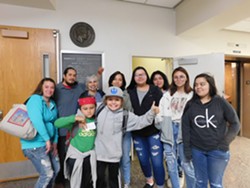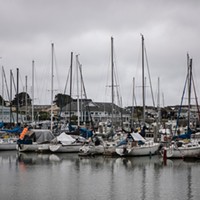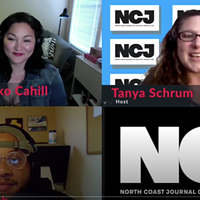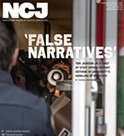Wednesday, March 10, 2021
Native American Curriculum Aims to Bring Culturally Informed Education and Representation to Humboldt County High Schools
Posted By Iridian Casarez on Wed, Mar 10, 2021 at 2:20 PM
The high school curriculum — dubbed the Advocacy and Water Protection in Native California High School Curriculum and Teacher's Resource Guide — features online, classroom and nature-based learning environments, and responds to reports that Humboldt, Del Norte and other counties are failing Native students, and that Native youth are facing a mental health crisis due to the COVID-19 pandemic and the state’s water and climate crises.
“This curriculum was created for high schools, however all of California’s primary and university students and faculty can benefit from the culturally informed lessons it provides,” said Cutcha Risling Baldy, HSU’s Native American Studies department chair. “California faces a water and climate crisis that will only be solved by foregrounding Indigenous management practices. Our restorative environmental management and tribal place-based knowledge are best practices for climate resiliency. If we teach the next generation how to better manage and live with the land. They will become the leaders that can solve our challenges.”
The Yurok Tribe, Blue Lake Rancheria and Humboldt County Office of Education will be hosting webinars on teaching culturally appropriate environmental education on March 26th and April 2 at 3:30 pm.
Read the full press release below.
Tribes, Schools, and NGO Release Water Protection in Native California High School Curriculum
Leaders Aim to Empower Next Generation of Water Protectors, Cultural Leaders, and Scientists
Eureka, California- Today Save California Salmon, the Blue Lake Rancheria, the Yurok Tribe's Visitor Center, KTJUSD’s Indian Education Program, Humboldt County’s Pathmakers Program, Humboldt State University’s (HSU) Native American Studies Department, and the Hoopa High School Water Protector’s Club released the Advocacy and Water Protection in Native California High School Curriculum and Teacher’s Resource Guide. The curriculum, which meets California state standards in science, social studies, health, history and language arts responds to California’s urgent water, climate and educational crises, along with the need for Native American culturally informed education and representation in schools.
The curriculum features online, classroom, and nature-based learning and responds to reports that Humboldt, Del Norte, and other counties are failing Native students, and that Native youth are facing a mental health crisis due to COVID-19 and the state’s water and climate crises.
“This curriculum was created for high schools, however all of California’s primary and university students and faculty can benefit from the culturally-informed lessons it provides” explained Dr. Cutcha Risling Baldy, Department Chair for HSU’s Native American Studies Department. “California faces a water and climate crisis that will only be solved by foregrounding Indigenous management practices. Our restorative environmental management and tribal place-based knowledge are best practices for climate resiliency. If we teach the next generation how to better manage and live with the land. They will become the leaders that can solve our challenges.”
Along with the curriculum, the alliance which includes the Yurok Tribe, Blue Lake Rancheria, and Humboldt County Office of Education announced they will host webinars on teaching culturally-appropriate environmental education on March 26th and April 2 at 3:30pm.
Save California Salmon also announced they will be hosting a Youth Water Protectors Challenge, will offer fellowships and grants directly to youth to work on water and land protection and education, and will host a webinar series on Traditional Ecological Knowledge, Science and Management with the HSU Native American Studies Department this spring.
“Save California Salmon (SCS) and our partners are not only planning to teach youth about water protection, advocacy, health, and culturally-informed water and land management,” explained Quartz Valley Tribal member and graduate student Darcey Evans, from Save California Salmon. “We plan to work directly with youth and families to support them in creating projects that will influence California policy, and benefit their watersheds and communities.”
The curriculum is based on the Advocacy and Water Protection in Native California Summer Speaker Series that was developed by Save California Salmon and HSU’s Native American Studies Department. The series and curriculum features lessons from Native leaders that work in law, land and water management, fisheries conservation, philanthropy, art, language, food security, health, policy and youth organizing. The curriculum integrates knowledge from Native American leaders in each lesson- a perspective that is often missing in California education.
Our culture and daily lives are connected to the water and land, and the subjects that we learn in school,” explained Hoopa Valley Tribal member Danielle Rey Frank from the Hoopa High School Water Protectors Club. “By connecting local issues and environments to our education, and encouraging us to apply what we are learning to benefit our communities and California policy, we are helping to solve critical issues and getting students excited to learn. Something about the curriculum that excites me is it educates us on how to sustain what we have left of the sacred world our ancestors left, while teaching what can be done to help revive it.”
“California youth are dealing with numerous challenges, including the COVID, climate and fisheries crisis. Our education should reflect this.” Frank added.
“This curriculum helps make learning meaningful to students. '' explained Margo Robbins Indian Education Director for the Klamath Trinity Unified School District. “It provides an opportunity for students to become active learners and involves them in meaningful hands-on projects that affect the health and well-being of their communities. It gives them a sense of responsibility and purpose while opening potential career pathways for them.”
Robbins is not only an educator but also a basket weaver and traditional fire manager that has presented on Cultural Burning as a preventative measure to climate change with the Governor’s Office.
The curriculum is offered at https://www.californiasalmon.org/curriculum-advocacy-water-protectio or through contacting [email protected]. Teachers can register for the March 26th and April 2 trainings at my.hcoe.net/event/advocacy-and-water-protection-in-native-california-curriculum-educators-training/
Youth can enter the “Youth Water Protector” challenge by creating videos, songs, tik toks, presentations, information flyers or articles, art or photo essays and posting them online with the hashtag #youthprotectors #waterprotectors, their tribe and watersheds. Submissions or links need to be posted and emailed to [email protected]. Prizes range from $100 to IPODs.
Follow the curriculum roll out and California youth protectors challenge and project at californiasalmon.org, tw: @CaliSalmon, Instagram @California Rivers or Save California Rivers on Facebook
Speaking of...
Readers also liked…
more from the author
-
An Upstream Intervention
Open Door hopes state grant will help address impacts of childhood trauma
- Feb 9, 2023
-
Humboldt County Still Working to Implement Organic Waste System
- Feb 2, 2023
-
Earl Robert Bootier: 1945-2022
- Jan 25, 2023
- More »




































